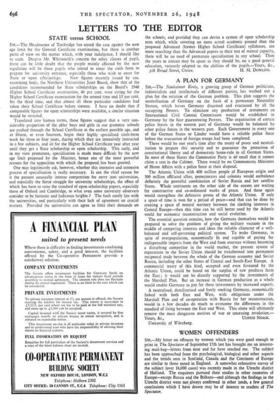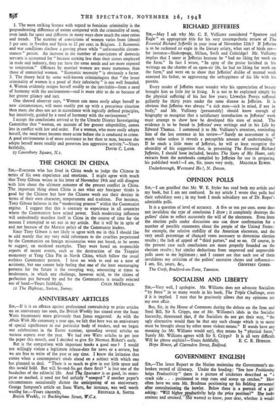WOMEN OFFENDERS
StR,—My letter on offences by women which you were good enough to print in The Spectator of September 17th last has brought me an interesi- ing mail-bag—letters from near and far have reached me. The subject has been approached from the psychological, biological and other aspects and the trends seen in Scotland, Canada and the Continent of Europe are similar to those noted in England. A somewhat exhaustive survey of the subject (over 16,000 cases) was recently made in the Utrecht district of Holland. The enquirers pursued their studies in other countries of Europe—except Russia and the Balkans—and although the findings ;in the Utrecht district were not always confirmed in other lands, a few general conclusions which I have drawn may be of interest to readers of The Spectator. 1. The most striking feature with regard to feminine criminality is the preponderating difference of extent compared with the criminality of men; even lands far apart and different in many ways show much the same ratios and trends. The number of convictions of women varies from (about) 5 per cent. in Sweden and Spain to 22 per cent. in Belgium. 2. Economic and war conditions disclose a passing phase while "unfavourable circum- stances" persist. An increase in the number of convictions of domestic servants is accounted for "because earning less than their sisters employed in trade and industry, they yet have the same needs and are more exposed to temptation." Offences by married women are more numerous than those of unmarried women. "Economic necessity" is obviously a factor.
3. The theory held by some well-known criminologists that "the lesser criminality of women is a proof of their inferiority" is not well founded.
4. Woman evidently resigns herself readily to the inevitable—from a need of harmony with the environment—and is more able to do so because of her greater pliancy and tact.
One shrewd observer says, "Woman can more easily adapt herself to new circumstances, will more readily put up with a precarious situation than man; she does not act in accordance with logically defined principles, but intuitively, guided by a need of harmony with the environment."
I accept the conclusions arrived at by the Utrecht District Investigating Committee that "woman, on account of her greater adaptability, comes less in conflict with law and order. For a woman, who more easily adapts herself, the need must become more acute before she is conduced to crime. A good environment is of more assistance to her than to man, because she adapts herself more readily and possesses less aggressive activity."—Yours





































 Previous page
Previous page